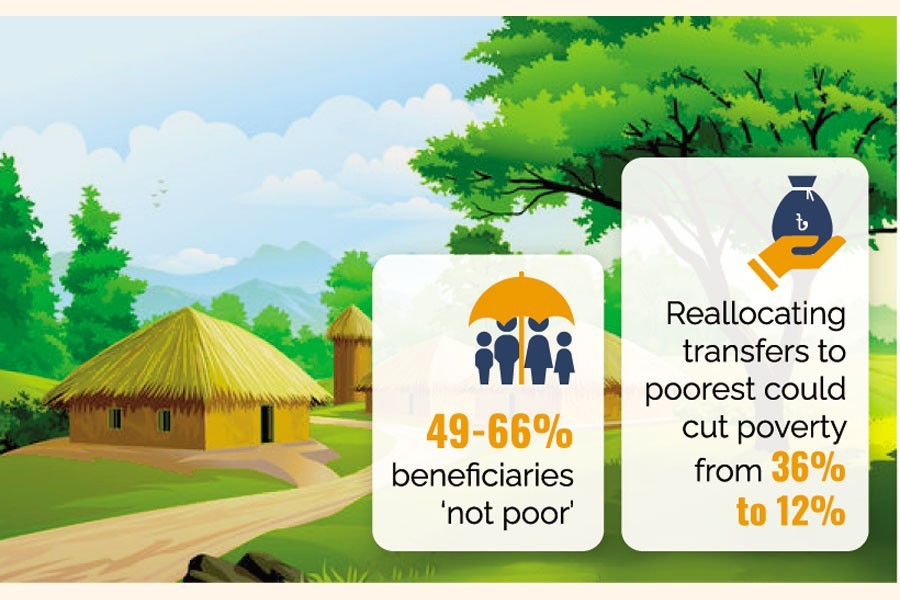Some 49-66 per cent of Bangladesh's social-safety-net-allowance-and food-support beneficiaries are not poor, says the World Bank, indicating porous delivery system for the state annuity.
It is one of the findings laid down in a WB report, titled 'Bangladesh Social Protection Public Expenditure Review', launched Thursday in Dhaka.
In its report the global development financier shows that overall 36 per cent of total social- protection spending serves only 0.45 percent of the country's population through the pensions for government officials.
The young but poor children are getting only 1.6 per cent of the total social-protection benefits from government exchequer although they represent one in eight poor in the country, it noted.
Presided over by Operation Manager in WB Dhaka office Dandan Chen, the report-launching programme was addressed, among others, by BRAC Chairperson Dr Hossain Zillur Rahman, Bangladesh Institute of Development Studies (BIDS) Director-General Dr Binayak Sen and Additional Secretary at the Finance Division Nazma Mobarek.
The WB in its report suggests reallocating existing transfers (social safety-net proceeds) to the poorest could reduce poverty from 36 per cent to 12 per cent in Bangladesh.
The Bank finds the social-protection programmes mostly focused on rural areas.
It found about 11 per cent of people in urban areas covered by social protection whereas 19 per cent of urban population poor.
"With almost one in five of the urban population is living in poverty, and half of the households at the risk of falling into poverty. There is a need for rebalancing geographic allocations between rural and urban areas," the Bank says in a set of recommendations.
"The coverage in rural areas is higher than the poverty rate, with programs reaching 36 per cent of people, while 26 per cent live in poverty. Using a social registry, such as the National Household Database can improve targeting of both programs and households at a reduced cost."
The WB report says labour-market programmes receive only 10 per cent of total social-protection expenditure. Most of the programmes are small and economic-inclusion programmes short-lived.
Among the social protections, food support and allowances in Bangladesh are rated as best performers, while stipends for secondary schools, rural TR, and urban old-age allowance (OAA) are "least progressive".
The World Bank says social-protection programmes remain central to Bangladesh's sustainable-development policy and are progressively benefitting the poorer households.
By improving the targeting of the social-protection programmes, the country can further reduce poverty, it adds.
In FY2020, Bangladesh spent about 2.6 per cent of GDP in social protection, which is in line with countries with similar income levels.
However, some risk groups remain underserved; in particular there are gaps in programming for early years and for the economic inclusion of poor and vulnerable youth and adults.
"To boost the quality and efficiency of service delivery, Government to Person (G2P) and mobile financial services should be scaled up. It takes about two months to transfer the funds from treasury to the beneficiary. The G2P scheme can cut processing time to 10 days," the World Bank says.
This also needs to be paired with increased allocations for staffing, capacity-building training including digital literacy, and improved equipment, which will facilitate enhanced implementation of programmes at the local level.
Dr Hossain Zillur Rahman said urban poverty is a new challenge for Bangladesh where it is still less-touched.
"The government has recently shifted some of its programmes to urban areas from rural, which is a big mistake. The separate programme for urban poor is imperative at this moment," he told the function.
BIDS DG Dr Binayak Sen said the government should introduce "universal income-generating scheme" for the poor.
Primarily, it can start the universal income programme for all old-age population in the country, he added.


